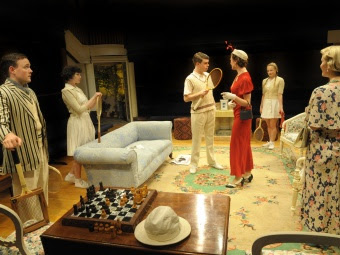Normally any play from this period (1930) that the Orange Tree does is fine entertainment and this one came with the added bonus of having been penned by W. Somerset Maugham who I had not only heard of but had bought one of his collections of short stories and had read them and had liked them.
That gave me a level of expectation that was never achieved.
The theatre was already busy by the time that I got in and I was forced to take my second choice seat, still in the front row but just to the left of the entrance steps rather than directly opposite.
The play tried to do four things and for me it did not do either of them very well.
The play concerns two nuclear families of rich city men, women who lunch and two children (one boy and one girl) in their student years. That the two families were identical struck me as lacking in imagination.
Because of this set up there is quite a lot of playing around with the generation gap. An example of this was early on when one of the boys suggested that people should be forced to retire at 40 and to give their money to their children so that they could make their impressions on the world.
Both couples had been married a long while, almost twenty years, becoming a little bored with each other along the way.
The adults had lived through the war and kept mentioning it whereas it meant little to the children who felt that it was time that their parents changed the subject.
One of the men, the breadwinner, responded to all this with a Rising Damp solution and proposes to leave his wife and family and to go and live somewhere else and to start a completely new life there.
 The main character did not convince me. He was making a momentous life-changing decision and seemed to be making it on a playful whim, as if a job, wife and family are things that you can walk away from like a worn out t-shirt.
The main character did not convince me. He was making a momentous life-changing decision and seemed to be making it on a playful whim, as if a job, wife and family are things that you can walk away from like a worn out t-shirt.The references to the War added little and got nowhere. Indeed, at times they got in the way. There was one bizarre scene in the second act where an important discussion started about the breadwinner's impending departure when the topic moved on to the War instead.
Similarly the boredom in marriage line never really developed. It provided some moments of humour for the Orange Tree audience, most of whom had been married for much longer than the breadwinner but that is all it did.
The generation gap also proved to be little more than a vehicle for some rather obvious jokes. The humour was welcome, it always is, but the play never tried to be a serious comedy, not could it be given the main story line.
Most of the characters were dull and simplistic; the young things just wanted to have fun, as did the women and the men were just concerned with work.
The construction of the play did not help. There was no physical action, apart from people entering and leaving the one room, so everything was in the dialogue. That is fine on the radio but works not so well on the stage.
 As if to compensate for this the direction had the cast move around the room in a way that looked most unnatural. For example, in the middle of one conversation one of the women went across and put the cards away and then later on one of the girls took them out again. All silly and pointless.
As if to compensate for this the direction had the cast move around the room in a way that looked most unnatural. For example, in the middle of one conversation one of the women went across and put the cards away and then later on one of the girls took them out again. All silly and pointless.Even the staging conspired against entertainment. The room was laid out with all of the furniture squarely around the edge of the stage forming a physical barrier between the cast and the audience.
None of these faults were disastrous, it is just that the combination of a weak plot, thin characterisation and bland direction produced something that amused at times but never excited. It also set a record for the most people that I have seen asleep at the Orange Tree at the same time, six for certain and maybe eight.
The brightest spot in a dull evening was a scene between the breadwinner and the woman in red (not his wife) towards the end of the play. Having done little but pout all evening the woman in red suddenly developed passion and I developed interest. Soon after her daughter did the same. It was as if they had both been hiding throughout the play and only decided to take it seriously at the end.
Apart from the two short scenes at the end the play limped along slowly and without obvious direction. There was nothing to get angry about but then there was nothing to get excited about either. It felt like a missed opportunity and left me with a huge sense of disappointment.








No comments:
Post a Comment
All comments are welcome. Comments are moderated only to keep out the spammers and all valid comments are published, even those that I disagree with!